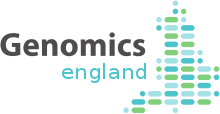Genomics England
Genomics England is a company set up and owned by the Department of Health and Social Care to run the 100,000 Genomes Project,[2] which aims to sequence 100,000 genomes from NHS patients with a rare disease and their families, and patients with cancer. An infectious disease strand is being led by Public Health England.[3][4][5]
 | |
| Formation | 5 July 2013 |
|---|---|
| Headquarters | Charterhouse Square London EC1M 6BQ[1] |
Parent organization | Department of Health and Social Care |
| Website | www |
In summer 2019, Chris Wigley was appointed CEO of Genomics England, starting in October 2019.[6]Wigley is a former McKinsey executive known for applying machine-learning and artificial-intelligence technology to transform performance. [7]
Activity
Genomics England was formally established as a company on 17 April 2013[8] and was formally launched on 5 July 2013 as part of the celebrations for the 65th Birthday of the UK's National Health Service [9] In August 2014, the Wellcome Trust announced that it was investing £27 million in a genome-sequencing hub for Genomics England, allowing the company to become part of the Wellcome Trust Genome Campus, home to the Sanger Institute. On the same date, Prime Minister David Cameron unveiled a new partnership between Genomics England and the sequencing firm Illumina. Illumina’s services for whole genome sequencing were secured in a deal worth around £78million.[10]
The UK Government also committed £250 million to genomics in the 2015 Spending Review, which ensures the continued role of Genomics England to deliver the project, beyond the life of the project and up to 2021.[11]
In October, 2018, the U.K.'s Secretary of State for Health and Social Care, Matt Hancock, announced that the program had been expanded with a new goal of sequencing five million genomes within five years. He also announced that starting in 2019, the NHS will offer whole genome sequencing (WGS) to all children suspected of having a rare genetic disease or with cancer.[12] The project has been making good progress. In July, 2019 Genomics England announced Data Release 7, which included the 100,000th whole genome available to researchers.[13]
Board members
The Board of Genomics England includes a number of notable scientists:[14]
- Sir John Chisholm (Executive Chair), former chair of the UK Medical Research Council
- Professor Mark Caulfield (Chief Scientist),[4] Queen Mary University of London
- Professor Sir John Bell, University of Oxford
- Dame Sally Davies (Non-executive Director), Chief Medical Officer (United Kingdom)
- Professor Ewan Birney (Non-executive Director), Director of the European Bioinformatics Institute (EMBL-EBI)[15]
- Professor Sir Malcolm Grant CBE (Non-executive Director), Chair of the NHS England Board
- Professor Michael Parker (Non-executive Director; Chair of the Ethics Advisory Committee), University of Oxford
- Jon Symonds CBE (Non-executive Director), Chair of Innocoll AG, former Chief Financial Officer of Novartis AG
- Professor Dame Kay Davies (Non-executive Director), University of Oxford
In addition to the delivery of the 100,000 Genomes Project, it is hoped that Genomics England will also mark the beginnings of a UK genomics industry and the start of a personalised medicine service for the NHS.[16]
History
Genomics England was established in July 2013 as a company fully owned by the UK Department of Health.[16][17][18] The company was launched by Jeremy Hunt, Secretary of State for Health on 5 July, in an announcement timed to coincide with the 65th birthday of the NHS.[18] A 2019 review identified the 100,000 Genomes Project as an exemplar in involving the public in genomic research[19].
See also
References
- "Contact Us". Genomics England. Retrieved 24 November 2019.
- McGrath, J.A. (2016). "Rare inherited skin diseases and the Genomics England 100 000 Genome Project". British Journal of Dermatology. 174 (2): 257–258. doi:10.1111/bjd.14362. ISSN 0007-0963. PMID 26871914.
- Moran, Nuala (2014). "10,000 rare-disease genomes sequenced". Nature Biotechnology. 32 (1): 7. doi:10.1038/nbt0114-7. ISSN 1087-0156.
- Ainsworth, Claire (2015). "Q&A: Mark Caulfield". Nature. 527 (7576): S5. doi:10.1038/527S5a. ISSN 0028-0836.
- Marx, Vivien (2015). "The DNA of a nation". Nature. 524 (7566): 503–505. doi:10.1038/524503a. ISSN 0028-0836.
- https://www.clinicalomics.com/topics/informatics-topic/genomics-england-appoints-ai-specialist-chris-wigley-as-ceo/
- https://www.genomicsengland.co.uk/chris-wigley-appointed-ceo-of-genomics-england/
- "GENOMICS ENGLAND LIMITED". Companies House. Retrieved 3 December 2017.
- "DNA mapping to better understand cancer, rare diseases and infectious diseases". Department of Health (England) . 5 July 2013. Retrieved 3 December 2017.
- Gallagher, James (1 August 2014). "DNA project 'to make UK world genetic research leader'". BBC News. Retrieved 1 August 2014.
- "Cancer patients join genome sequencing project - News stories - GOV.UK". www.gov.uk. Retrieved 6 June 2016.
- https://www.genomicsengland.co.uk/matt-hancock-announces-5-million-genomes-within-five-years/
- https://www.genomicsengland.co.uk/100000-genomes-for-approved-researchers/
- "The Board - Genomics England". genomicsengland.co.uk. July 2013. Retrieved 12 September 2014.
- "Professor Ewan Birney appointed to the Genomics England Board | Genomics England". Genomics England. 26 May 2016. Retrieved 6 June 2016.
- Ramesh, Randeep; Editor, Social Affairs (4 July 2013). "Jeremy Hunt launches genomics body to oversee healthcare revolution". The Guardian. The Guardian. Retrieved 12 September 2014.
- Ramesh, Randeep; Editor, Social Affairs (4 July 2013). "Jeremy Hunt launches genomics body to oversee healthcare revolution". The Guardian. The Guardian. Retrieved 12 September 2014.
- "DNA mapping to better understand cancer, rare diseases and infectious diseases". UK Government. 5 July 2013. Retrieved 26 May 2016.
- Lacaze, Paul; Fransquet, Peter; Tiller, Jane; Nunn, Jack S. (2019). "Public Involvement in Global Genomics Research: A Scoping Review". Frontiers in Public Health. 7. doi:10.3389/fpubh.2019.00079. ISSN 2296-2565. PMC 6467093. PMID 31024880.